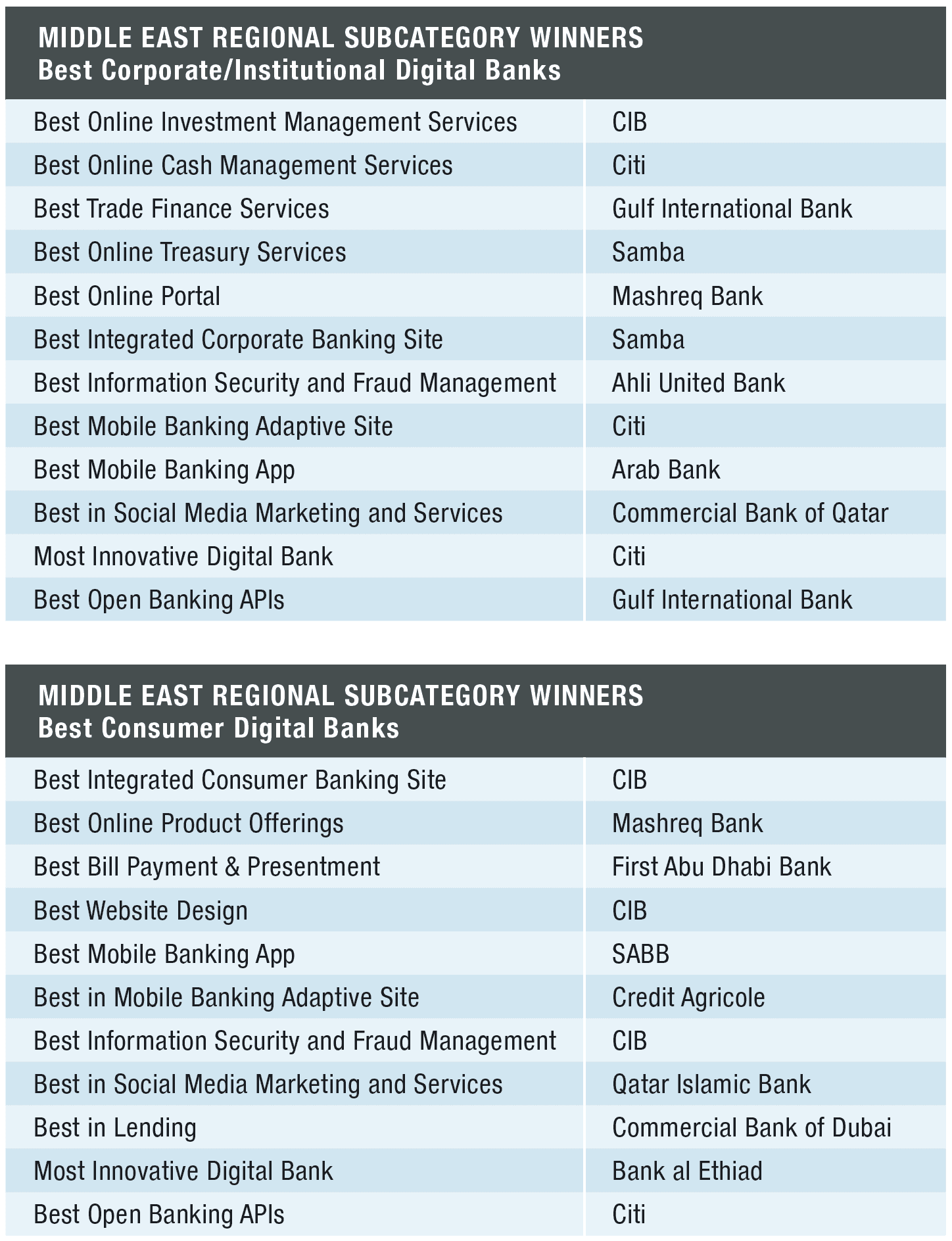Middle East regional winners of Global Finance’s Best Digital Bank awards are ramping up the shift to digital banking.

Technology promises greater resiliency, innovation and opportunities alongside improved efficiency and customer service. But the Covid pandemic has forced banks to reassess their digital transformation strategies, particularly how they are interact with clients and customers, putting more pressure on the industry to provide seamless digital solutions.
More than half (53%) of Middle East consumers have increased their reliance on mobile shopping due to the pandemic and only 9% do not report shopping online, according to PricewaterhouseCoopers’s recent Covid-19 Pulse Survey. While the pandemic has made the switch to digital an imperative, the Middle East winners of Global Finance’s 2020 awards for Best Corporate/Institutional Digital Bank and Best Consumer Digital Bank have gone farther, grasping not just the necessity but the opportunities the transformation presents by increasing both the reach and depth of their digital services.
Arab Bank fast-tracked the launch of its new mobile payments service, Arabi MobiCash, across 300-plus merchants in Jordan at the start of the pandemic. Now, customers can read a Quick Response code to get purchases approved from via phone, merchants enjoy faster payment from the paperless service and Arab Bank gains better insights into the cash flow movements of its corporate clients.
Saudi British Bank has partnered with fintechs to revamp its mobile app, an overhaul touching on real time cross-border payments, personal finance management and customer journey design. The app now includes over 100 features.
Credit Agricole regularly adds new features to its app, banki Mobile; recent improvements include instant transfers and payments, including Egypt’s first service allowing funds transfer from accounts to mobile wallets.
To support small and medium-sized enterprises, First Abu Dhabi Bank (FAB) recently launched a digital marketplace powered by its digital wallet, payit. FAB has also simplified bill payments for both customers and non-customers over both payit and its mobile banking app.
As the first Islamic bank globally to introduce the commercial finance broker One Click Finance, allowing instant credit through its QIB Mobile App, Qatar Islamic Bank has a strong focus on SMEs. Its Aamaly (My Business) program provides tailored products and services to SMEs and it also offers the first Islamic point of sales (POS) and online payment gateway in the Qatari market, with an array of electronic payment solutions.
Mashreq Bank has revamped its user interface and improved the user experience through greater processing efficiencies while standardizing integration of customer relationship management across all digital channels to facilitate smoother processing of offers, complaints and service requests.
Last December, Commercial Bank of Dubai launched the CBD One credit card–“the UAE’s first credit card powered by you!–allowing customers to choose their card design from an array of artistic designs, choose monthly flexible plans, and spend up to AED500 on free video streaming, Uber, Airbnb or coffee. The credit card was the first product to go live that originated in CBD’s two-year-old innovation lab.
Innovation and Integration
The double hit from the coronavirus and the drop in oil revenues has forced Middle Eastern banks to become more agile and adaptable if they want to remain competitive and enjoy strong growth in the future. Understanding the need for continual innovation, Citi regularly enhances its solutions and introduces new offerings. A recent example is Cross Currency Sweeps, which combines cash concentration sweeps with automated currency conversion to aggregate foreign currency balances in the client’s currency of choice.
Citi is also using advanced analytics, artificial intelligence (AI) and machine learning to help identify payments that do not conform to past payment patterns. A cross-border B2B payments platform with embedded foreign exchange capabilities eases collection of funds from overseas. And expansion of Citi’s instant payments offering, now available in 23 markets and payments into digital wallets, promises greater payment choice.
Citi has also developed an API strategy for transaction banking and corporate customers, allowing clients to purchase treasury services à la carte while the CitiConnect API Developer Portal helps corporates integrate treasury services with their native management processes and software.
Bankal Etihad is finalizing its open-banking developer portal, which aims to allow products and services to be built along modular lines on top of an API layer. With more than 400 APIs, the portal will offer clients a platform style of banking.
API technology is also allowing Gulf International Bank (GIB) to offer a menu of transaction banking products and services to its clients, anytime and anywhere, via customized integration. APIs give GIB clients greater flexibility and choice of services, delivering real-time data through secured access and instant data on demand, all consolidated in a dashboard presentation. This allows clients to access banking services through their preferred apps rather than through banking channels.
Commercial International Bank (CIB) developed a single API Gateway that integrates transaction processing, data and message interchange seamlessly and securely with its multiple payment and collection products and channels, client enterprise resource planning and billing systems, third party vendors, payment service providers and aggregators. The API Gateway promises CIB customers a uniform experience with enterprise-grade security while CIB manages the APIs centrally.
Increased digital uptake has made cybersecurity a key concern for banks. CIB Business Online, the bank’s digital financial solution channel for its corporate and business banking clients, requires two-factor authentication; each user has a unique ID and password and uses a one-time password, via a secure token, to authenticate any financial transaction.
Ahli United Bank (AUB) also invested in cybersecurity technologies to protect customers’ data and systems to provide real time fraud monitoring and control. Digital innovations that AUB has developed recently include eMyHassad, asavings product with full digital onboarding capability using biometrics, Virtual Queuing, Video Banking and the launch of AUB’s Visual Interactive Voice response (VIVR) system.
Samba Financial Group has been working to digitize treasury services by integrating them with online payments, enabling customers to book foreign exchange deals online from the payments screen. Online transactions incur lower pricing and Samba makes FX and commodity rates available real-time.
Commercial Bank of Qatar has developed its Corporate Internet Banking Portal to include a dashboard, alerts, customizable widgets and an intuitive and user-friendly design. An account aggregation feature provides a single view of accounts while Commercial Bank’s investments in robotic process automation and AI aim to improve the client experience.
At the moment, banks are betting that further investment in technology will cement their relationships with consumers, corporate clients and institutional investors by helping clients to navigate their financial path in a post Covid-19 world. Digital banking is clearly the centerpiece of that wager.




